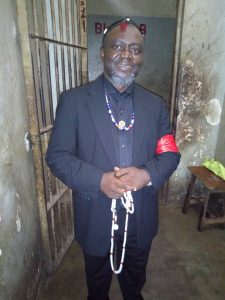30, July 2019
Man who pushed German boy under train was on run from Swiss police 0
An Eritrean man accused of killing an eight-year-old boy by pushing him under a train in Germany had been on the run from Swiss police after a violent incident last week, authorities said Tuesday.
The married father-of-three, identified by German media only as 40-year-old Habte A., had also undergone psychiatric treatment this year, said police in the Swiss canton of Zurich where he lived.
Last Thursday, he had flown into a rage and threatened a neighbour with a knife and locked her up, and also trapped his wife and their children, aged one, three and four, in their flat before running away.
Spiegel Online reported that the asylum seeker who had lived in Switzerland for 13 years had worked in tram maintenance for the Zurich Transport Authority since early last year.
German federal police chief Dieter Romann said it appeared the suspect had not been listed as wanted in European police databases and had been able to cross borders freely.
German prosecutors laid murder and attempted murder charges against the man over the attack Monday that left eye-witnesses in need of trauma counselling and shocked the nation.
He allegedly also pushed the boy’s mother onto the tracks at Frankfurt’s main station, and tried but failed to do the same to a 78-year-old woman.
“While the mother could roll off after the fall and move herself onto a narrow footpath between two tracks, her child was caught by the arriving train and died, on the spot, of his injuries,” said a statement by Frankfurt prosecutors.
– Psychiatric examination –
The man ran down a platform and across tracks but was followed by passers-by including an off-duty officer, and overpowered by police two blocks from the station.
The suspect did not previously know the victims and showed no signs of alcohol or drug use, prosecutors spokeswoman Nadja Niesen said.
“The crime suggests a psychiatric disorder,” she told a press conference, adding that an examination would ascertain the level of his criminal culpability.
The horrific crime has dominated newspaper front-pages and TV news bulletins, and led politicians to call for heightened security, more camera surveillance and tighter border controls.
Citizens have laid flower wreaths, candles and stuffed toys at the site of the killing and a memorial service was scheduled at the station in the evening.
German Interior Minister Horst Seehofer cut short his summer holiday to meet the heads of major security agencies in Berlin.
Niesen said the man in custody had not yet spoken about a motive.
If formally charged, tried and then found guilty, he would face a likely term of life in prison, she said.
In a similar case earlier this month, a 34-year-old mother died after being pushed in front of a train, allegedly by a Serbian man.
Germany’s far-right has seized on both killings to once more criticise would it regards as the flawed immigration policies of Chancellor Angela Merkel’s government
Source: AFP































31, July 2019
Understanding the Kondengui Prison riot 0
Crushed inside disease-ridden cells, with no beds, little food and even less hope, inmates in Cameroon’s prisons were already tense before an influx of political detainees and Anglophone separatists stirred up an explosive mix.
At an overcrowded central prison in the capital Yaounde this week, hundreds of prisoners revolted against their poor conditions in an upsurge of violence broadcast on Facebook.
On Monday, videos spread across social media of prisoners ransacking and burning the Kondengui jail library and a sewing workshop before security forces crushed the mutiny.
Filming on their phones, inmates posted parts of their protest, chanting: “We want more to eat than porridge,” and “We want to go to trial.”
A day later, security services had reestablished control.
But the riot highlighted the crisis in the central African nation’s prisons, exacerbated by a crackdown on opposition parties, Boko Haram militants, and a separatist uprising that has rocked English-speaking regions since 2016.
“Prison overcrowding is exacerbated by the socio-political crisis that began in 2016 in the Anglophone areas and the post-election crisis,” said Maximilienne Ngo Mbe, director of the local REDHAC rights group.
“The situation in Cameroonian prisons has become catastrophic… How is it that people languish in prison for two or three years without being tried.”
The Cameroon prison population has increased steadily from 23,500 in 2013 to almost 31,000 in December 2017, according to the last report published in 2018 by the National Commission for Human Rights and Freedoms of Cameroon.
Kondengui prison, the scene of the riot, was built to accommodate 1,500 inmates but is estimated to house more than double.
Some prison occupancy rates are three times over normal capacity, according to official data.
Rights groups say prisons also suffer from a prevalence of tuberculosis, HIV, AIDS, cholera and scabies.
– Growing numbers –
Since 2017, fighting between government troops and English-speaking separatists demanding independence in two western regions has killed hundreds and forced nearly 500,000 people from their homes.
The government has rejected the demands for autonomy and cracked down on English-speaking communities which chafe at what they see as discrimination from the French-speaking majority.
Some prisons have been filled with English-speaking activists accused of militancy by the authorities, but who are yet to face trial.
In Buea, the capital of an English-speaking region, tensions erupted at a prison on Tuesday housing many separatist inmates — a day after the revolt in Yaounde.
Gunshots were heard around the prison and flame and smoke were seen rising from its roof, witnesses said. Prisons have increasingly become political incubators, according to analysts, also because the opposition MRC party has faced a crackdown.
Party chief Maurice Kamto has been held in jail in Yaounde since January after claiming the 2018 presidential election results were rigged.
The official victor — President Paul Biya, now in power for 36 years — has long sought to control the political space in the country.
Last month hundreds of opposition supporters were also arrested.
Many have been released but after the Kondengui prison riot, lawyers for MRC members still detained said several had been taken to a security force detention facility.
Human Rights Watch has warned that over the past year security forces at such facilities have “used torture without fear of repercussion.”
– Packed into cells –
Prison overcrowding is also blamed on the fight against Nigeria-based Boko Haram jihadists, which have launched numerous attacks in the country.
For years, prisons in Cameroon’s big cities have struggled, says Marie Morelle, a geographer at the University Paris 1, and specialist in the country’s prisons.
In the north of the country, the jailing of Boko Haram fighters alongside the crackdown on suspected separatist militants has accentuated overcrowding in the northern Maroua prison, she said.
The arrival of political prisoners in recent years has encouraged the expression of grievances, Morelle added. Mutinies in Cameroon prisons are not uncommon. In 2015, a revolt broke out in the prison of Garaoua in the north, following the death of an inmate.
He died of suffocation after being locked in a disciplinary cell measuring 4 metres squared and packed with 22 people.
In 2016, a riot erupted in the same prison over a lack of drinking water.
A year later in Baffoussam in the west, prisoners protested jail conditions and in Kumbo a jail was partially destroyed by a riot and fire.
Culled from InfoSurhoy